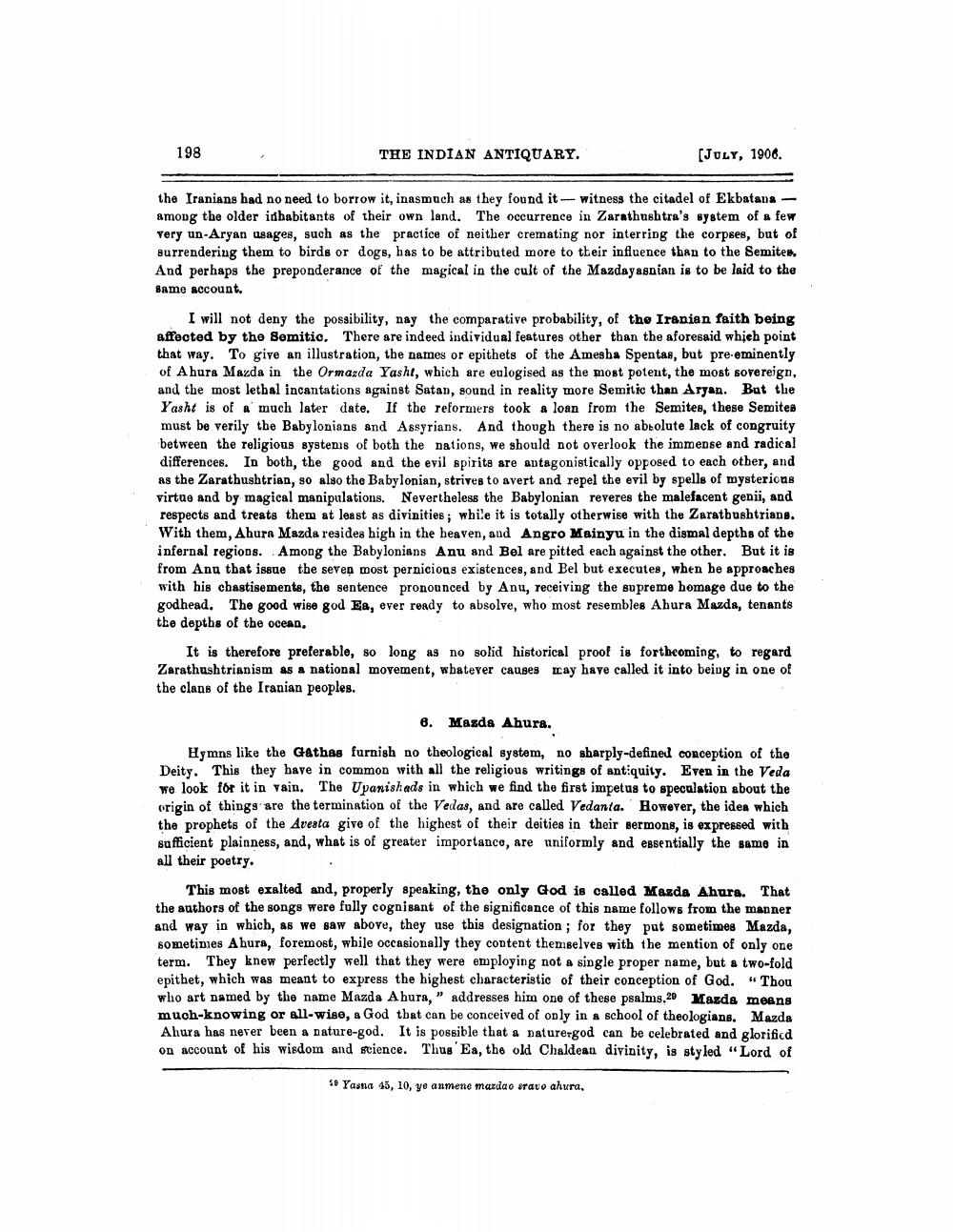________________
198
THE INDIAN ANTIQUARY.
[JULY, 1906.
the Iranians had no need to borrow it, inasmuch as they found it witness the citadel of Ekbatana - among the older inhabitants of their own land. The occurrence in Zarathushtra's system of a few very un-Aryan usages, such as the practice of neither cremating nor interring the corpses, but of surrendering them to birds or dogs, has to be attributed more to their influence than to the Semites. And perhaps the preponderance of the magical in the cult of the Mazdayasnian is to be laid to the same account.
I will not deny the possibility, nay the comparative probability, of the Iranian faith being affected by the Semitic. There are indeed individual features other than the aforesaid which point that way. To give an illustration, the names or epithets of the Amesha Spentas, but pre-eminently of Ahura Mazda in the Ormazda Yasht, which are eulogised as the most potent, the most sovereign, and the most lethal incantations against Satan, sound in reality more Semitic than Aryan. But the Yasht is of a much later date. If the reformers took a loan from the Semites, these Semites must be verily the Babylonians and Assyrians. And though there is no absolute lack of congruity between the religious systems of both the nations, we should not overlook the immense and radical differences. In both, the good and the evil spirits are antagonistically opposed to each other, and as the Zarathushtrian, so also the Babylonian, strives to avert and repel the evil by spells of mysterious virtue and by magical manipulations. Nevertheless the Babylonian reveres the malefacent genii, and respects and treats them at least as divinities; while it is totally otherwise with the Zarathushtrians. With them, Ahura Mazda resides high in the heaven, and Angro Mainyu in the dismal depths of the infernal regions. Among the Babylonians Anu and Bel are pitted each against the other. But it is from Anu that issue the seven most pernicious existences, and Bel but executes, when he approaches with his chastisements, the sentence pronounced by Anu, receiving the supreme homage due to the godhead. The good wise god Ea, ever ready to absolve, who most resembles Ahura Mazda, tenants the depths of the ocean.
It is therefore preferable, so long as no solid historical proof is forthcoming, to regard Zarathushtrianism as a national movement, whatever causes may have called it into being in one of the clans of the Iranian peoples.
6. Mazda Ahurs.
Hymns like the Gathas furnish no theological system, no sharply-defined conception of the Deity. This they have in common with all the religious writings of antiquity. Even in the Veda we look for it in vain. The Upanishads in which we find the first impetus to speculation about the origin of things are the termination of the Vedas, and are called Vedanta. However, the idea which the prophets of the Avesta give of the highest of their deities in their sermons, is expressed with sufficient plainness, and, what is of greater importance, are uniformly and essentially the same in all their poetry.
This most exalted and, properly speaking, the only God is called Mazda Ahura. That the authors of the songs were fully cognisant of the significance of this name follows from the manner and way in which, as we saw above, they use this designation; for they put sometimes Mazda, sometimes Ahura, foremost, while occasionally they content themselves with the mention of only one term. They knew perfectly well that they were employing not a single proper name, but a two-fold epithet, which was meant to express the highest characteristic of their conception of God. "Thou who art named by the name Mazda Ahura," addresses him one of these psalms, 20 Mazda means much-knowing or all-wise, a God that can be conceived of only in a school of theologians. Mazda Ahura has never been a nature-god. It is possible that a nature-god can be celebrated and glorificd on account of his wisdom and science. Thus Ea, the old Chaldean divinity, is styled "Lord of
19 Yasna 45, 10, ye anmene mazdao eravo ahura,




